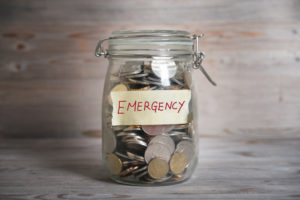What are reserve funds? Homeowners association reserve funds are one of two principal accounts necessary to manage your community. As a homeowner who pays monthly dues, you should understand the purpose of reserve funding and how it is used by the association. Here’s everything you need to know about HOA reserve funds.
What Are HOA Reserve Funds?
When it comes to HOA finances, homeowners should know about two primary accounts — the operating fund and the reserve fund. Operating funds pay for daily expenses and ongoing maintenance of community assets. They represent the majority of financial transactions in an HOA.
What is a reserve fund? This, on the other hand, is the community’s savings account. HOA reserves act like a cushion that protects the association from unplanned expenses and essential upgrades over time. Associations are able to fund their reserve account by allotting a certain percentage of the HOA dues each month. For some HOAs, this is usually about 20 to 40 percent.
What Are HOA Reserve Funds Used For?

Reserve funds are used for large-scale maintenance and repairs of assets in the association. Most of these projects come with a high price tag; however, since they are expected, the HOA can start saving money ahead of time.
For example, an HOA’s clubhouse will need a roof replacement in 10 years’ time. The project is estimated to cost $100,000. Collecting the entire amount when the project commences puts too much financial burden on the residents. Instead, the HOA can collect smaller amounts over a 10-year period. The HOA will then put the money in the reserve account and will only be for the roof replacement project.
You can also use HOA reserve funds for large landscaping projects, repainting common buildings, adding sidewalks, repaving roads, swimming pool repairs, and construction of an amenity.
Why Do You Need Reserve Funds?
 The main purpose of an HOA is to operate, maintain, repair, and replace the community’s shared areas. The board will not be able to do this without adequate operating and reserve funds.
The main purpose of an HOA is to operate, maintain, repair, and replace the community’s shared areas. The board will not be able to do this without adequate operating and reserve funds.
Apart from large-scale maintenance and repair projects, HOA reserve funds are also useful in case of unexpected damage or emergencies. For example, if a powerful storm wrecks your water pipes, you will need to repair them immediately. Given the urgency of these matters, the HOA will likely not have enough time to come up with the money for repairs. If you have a reserve fund, you can use this money for the repairs.
If you do not have a reserve fund, the HOA may have no other option than to significantly raise HOA dues or levy a special assessment. This scenario also places a lot of financial stress and burden on homeowners.
How Much Do You Need for Reserve Funds?
 There’s no set amount for an HOA reserve fund. The answer to this question will depend on several factors including the number of assets in the community and the condition of these assets. In order to determine the amount needed, HOAs should conduct a reserve study.
There’s no set amount for an HOA reserve fund. The answer to this question will depend on several factors including the number of assets in the community and the condition of these assets. In order to determine the amount needed, HOAs should conduct a reserve study.
A reserve study inspects HOA assets and finances to come up with a long-term schedule of potential repairs and costs. A reserve study company will estimate the necessity, timing, and cost of replacement and repairs to all common areas in the coming 20 to 30 years. This will tell you how much you need for your HOA reserve funds.
Reserve studies should be conducted by a professional every 3 to 5 years. There are many factors that affect the lifespan of your assets, so make sure the reserve study is updated before making any financial decisions.
What Is the Correct Reserve Level?
 An HOA reserve fund should always be 100 percent funded. However, the unfortunate reality is that most HOA reserve funds are underfunded. Associations have a hard time allocating a sufficient amount of money to their reserve account, and this can create a lot of risk for your community.
An HOA reserve fund should always be 100 percent funded. However, the unfortunate reality is that most HOA reserve funds are underfunded. Associations have a hard time allocating a sufficient amount of money to their reserve account, and this can create a lot of risk for your community.
If you cannot attain 100 percent funding, at least aim for a certain reserve level. As an HOA reserves rule of thumb, the reserve account should be at least 70 percent funded. If the reserve study determined that the account should have $30,000, you will be relatively safe with at least $21,000. That way, if there is an urgent matter, you will only need to collect $9,000 more from the homeowners.
If you don’t want to create an undue burden on homeowners, strive to have your HOA reserve account fully funded. This will eliminate the need for any special assessment.
How Can HOAs Manage Their Reserve Funds Properly?
There’s no use to having a reserve fund if you cannot manage it properly. Only use reserve funds for their intended purpose. The HOA should not use reserves to pay for operating expenses or unnecessary repairs.
Reserve fund management is crucial if you want to protect your community’s money. Self-managed HOAs often lack the financial expertise and experience to handle these kinds of matters. HOA’s who want to ensure their financial health should consider working with an HOA accounting and management company.
What Is My Community’s Policy on HOA Reserve Funds?
If you are a prospective homeowner, always check a community’s CC&Rs or bylaws for their policy on HOA reserve funds. This will provide insight into their current practices when it comes to unanticipated expenses and large-scale capital projects. You’ll also discover the criteria that govern their HOA reserve funds. Do not hesitate to ask the board or HOA manager about how they are using their reserves. It’s always best to choose a community that knows how to manage their finances properly.
How Can HOA Reserve Funds Protect Your Community?
HOA reserve funds are important to boost property values as well as homeowners’ satisfaction levels. Your community should always prepare for both expected and unexpected expenses. Otherwise, the financial stress and burden will be placed on the residents’ shoulders. Now that you know the basics of reserve funding, the HOA will be able to manage it properly and efficiently. If you need assistance on your HOA reserve funds, do not hesitate to give us a call.
RELATED ARTICLES:
- What Is An HOA Reserve Study? Is It Necessary?
- 6 Factors To Consider When Choosing An HOA Reserve Study Company
- How To Choose The Right Bank For An HOA

